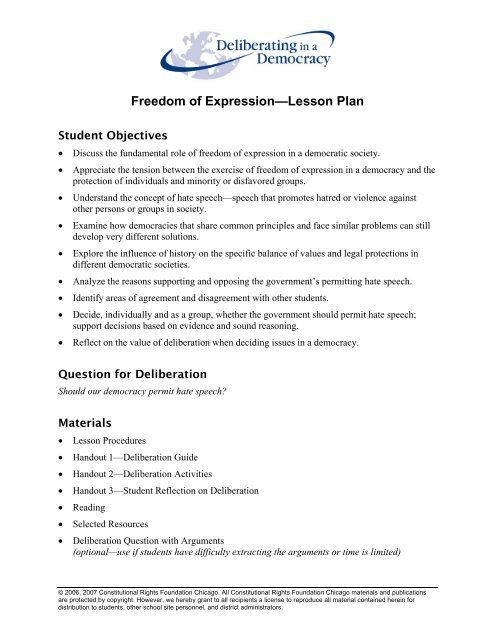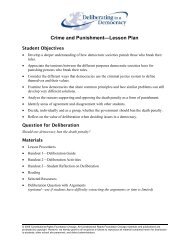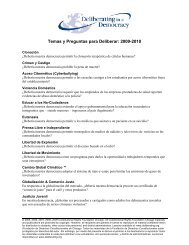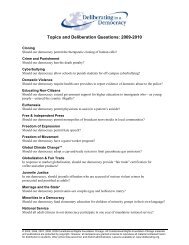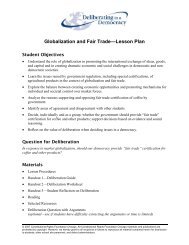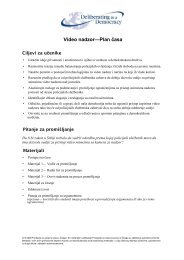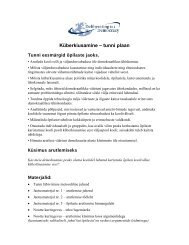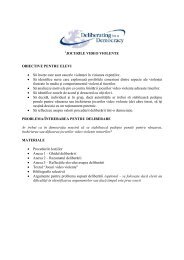Freedom of ExpressionâLesson Plan - Deliberating in a Democracy
Freedom of ExpressionâLesson Plan - Deliberating in a Democracy
Freedom of ExpressionâLesson Plan - Deliberating in a Democracy
Create successful ePaper yourself
Turn your PDF publications into a flip-book with our unique Google optimized e-Paper software.
<strong>Freedom</strong> <strong>of</strong> Expression—Lesson <strong>Plan</strong><br />
Student Objectives<br />
<br />
<br />
<br />
<br />
<br />
<br />
<br />
<br />
<br />
Discuss the fundamental role <strong>of</strong> freedom <strong>of</strong> expression <strong>in</strong> a democratic society.<br />
Appreciate the tension between the exercise <strong>of</strong> freedom <strong>of</strong> expression <strong>in</strong> a democracy and the<br />
protection <strong>of</strong> <strong>in</strong>dividuals and m<strong>in</strong>ority or disfavored groups.<br />
Understand the concept <strong>of</strong> hate speech—speech that promotes hatred or violence aga<strong>in</strong>st<br />
other persons or groups <strong>in</strong> society.<br />
Exam<strong>in</strong>e how democracies that share common pr<strong>in</strong>ciples and face similar problems can still<br />
develop very different solutions.<br />
Explore the <strong>in</strong>fluence <strong>of</strong> history on the specific balance <strong>of</strong> values and legal protections <strong>in</strong><br />
different democratic societies.<br />
Analyze the reasons support<strong>in</strong>g and oppos<strong>in</strong>g the government’s permitt<strong>in</strong>g hate speech.<br />
Identify areas <strong>of</strong> agreement and disagreement with other students.<br />
Decide, <strong>in</strong>dividually and as a group, whether the government should permit hate speech;<br />
support decisions based on evidence and sound reason<strong>in</strong>g.<br />
Reflect on the value <strong>of</strong> deliberation when decid<strong>in</strong>g issues <strong>in</strong> a democracy.<br />
Question for Deliberation<br />
Should our democracy permit hate speech?<br />
Materials<br />
<br />
<br />
<br />
<br />
<br />
<br />
<br />
Lesson Procedures<br />
Handout 1—Deliberation Guide<br />
Handout 2—Deliberation Activities<br />
Handout 3—Student Reflection on Deliberation<br />
Read<strong>in</strong>g<br />
Selected Resources<br />
Deliberation Question with Arguments<br />
(optional—use if students have difficulty extract<strong>in</strong>g the arguments or time is limited)<br />
© 2006, 2007 Constitutional Rights Foundation Chicago. All Constitutional Rights Foundation Chicago materials and publications<br />
are protected by copyright. However, we hereby grant to all recipients a license to reproduce all material conta<strong>in</strong>ed here<strong>in</strong> for<br />
distribution to students, other school site personnel, and district adm<strong>in</strong>istrators.
<strong>Freedom</strong> <strong>of</strong> Expression—Read<strong>in</strong>g<br />
1<br />
2<br />
3<br />
4<br />
5<br />
6<br />
7<br />
8<br />
9<br />
10<br />
11<br />
12<br />
Almost all 192 members <strong>in</strong> the United Nations have agreed to follow the Universal<br />
Declaration <strong>of</strong> Human Rights. Article 19 <strong>of</strong> that Declaration states that “Everyone has the right<br />
to freedom <strong>of</strong> op<strong>in</strong>ion and expression; this right <strong>in</strong>cludes freedom to hold op<strong>in</strong>ions without<br />
<strong>in</strong>terference and to seek, receive, and impart <strong>in</strong>formation and ideas through any media regardless<br />
<strong>of</strong> frontiers.” In the words <strong>of</strong> the non-governmental organization <strong>Freedom</strong> House, “The operative<br />
word is ‘everyone.’ To deny that doctr<strong>in</strong>e is to deny the universality <strong>of</strong> <strong>in</strong>formation freedom—a<br />
basic human right.”<br />
Democracies believe that free expression is essential to their societies. Free expression, they<br />
argue, dist<strong>in</strong>guishes them from non-democratic countries. Even democracies, however, limit or<br />
prohibit certa<strong>in</strong> k<strong>in</strong>ds <strong>of</strong> speech they consider harmful or dangerous. An example <strong>of</strong> this tension<br />
between free expression and other democratic values is hate speech—speech that promotes<br />
hatred or violence aga<strong>in</strong>st other persons or groups <strong>in</strong> society.<br />
13<br />
14<br />
15<br />
16<br />
17<br />
18<br />
19<br />
The Role <strong>of</strong> Free Expression <strong>in</strong> Democratic Societies<br />
Self-government requires that citizens have accurate, adequate, and current <strong>in</strong>formation about<br />
issues fac<strong>in</strong>g their society. When ideas can be heard, exam<strong>in</strong>ed, and questioned, society can<br />
develop culturally, economically, and scientifically. Free expression also allows people to vent<br />
their anger or frustration with the government and with other problems. It therefore decreases the<br />
likelihood that people will turn to violent means to express themselves. <strong>Freedom</strong> <strong>of</strong> expression<br />
rema<strong>in</strong>s one <strong>of</strong> the most basic rights <strong>in</strong> a democracy.<br />
© 2006, 2007 Constitutional Rights Foundation Chicago. All Constitutional Rights Foundation Chicago materials and publications<br />
are protected by copyright. However, we hereby grant to all recipients a license to reproduce all material conta<strong>in</strong>ed here<strong>in</strong> for<br />
distribution to students, other school site personnel, and district adm<strong>in</strong>istrators.
20<br />
21<br />
22<br />
23<br />
24<br />
25<br />
26<br />
27<br />
28<br />
29<br />
30<br />
31<br />
32<br />
33<br />
34<br />
35<br />
Democratic Government: Protector and Regulator <strong>of</strong> Free Expression<br />
Democratic governments <strong>in</strong> both North America and Europe protect freedom <strong>of</strong> expression.<br />
They also reta<strong>in</strong> certa<strong>in</strong> powers to limit it. For example, the First Amendment to the U.S.<br />
Constitution states that “Congress shall make no law… abridg<strong>in</strong>g the freedom <strong>of</strong> speech, or <strong>of</strong><br />
the press.” Yet freedom <strong>of</strong> speech has never been considered absolute <strong>in</strong> the United States. In<br />
recent years the U.S. Supreme Court has <strong>in</strong>creased protections for those who support unpopular<br />
ideas. American civic educators Lee Arbetman and Ed O’Brien note, however, that the Court has<br />
also held that the government reta<strong>in</strong>s the power to limit or punish the content <strong>of</strong> certa<strong>in</strong> k<strong>in</strong>ds <strong>of</strong><br />
speech, such as obscenity, commercial speech, defamation, “fight<strong>in</strong>g words,” and <strong>in</strong>citement.<br />
Other countries’ laws also balance protections and limits on freedom <strong>of</strong> expression. The 48-<br />
nation Council <strong>of</strong> Europe states <strong>in</strong> Article 10 <strong>of</strong> its Convention on Human Rights that “Everyone<br />
has the right to freedom <strong>of</strong> expression…. without <strong>in</strong>terference by public authority and regardless<br />
<strong>of</strong> frontiers.” Yet Article 10 also <strong>in</strong>cludes a long list <strong>of</strong> exceptions. This freedom can be limited<br />
to prevent crime and protect national security, public safety, the public health and morality, the<br />
judiciary, and “the reputation or rights <strong>of</strong> others.” The Council <strong>in</strong>cludes Azerbaijan, Czech<br />
Republic, Estonia, Lithuania, Macedonia, Romania, the Russian Federation, Serbia, and Ukra<strong>in</strong>e.<br />
36<br />
37<br />
38<br />
39<br />
40<br />
41<br />
Democracies and Free Expression: Law Shaped by History<br />
Many democratic societies are composed <strong>of</strong> people from different races, cultures, languages,<br />
religions, or ethnicities. Often tension arises between the majority and dist<strong>in</strong>ct religious, ethnic,<br />
cultural, or ideological m<strong>in</strong>orities. This tension can <strong>in</strong>crease dur<strong>in</strong>g times <strong>of</strong> economic or social<br />
unrest, or when a group believes that it is be<strong>in</strong>g treated unfairly. Some <strong>of</strong> these grievances go<br />
back many centuries.<br />
<strong>Deliberat<strong>in</strong>g</strong> <strong>in</strong> a <strong>Democracy</strong> © 2006, 2007 Constitutional Rights Foundation Chicago. 2
42<br />
43<br />
44<br />
45<br />
46<br />
47<br />
48<br />
49<br />
50<br />
51<br />
52<br />
53<br />
54<br />
55<br />
56<br />
57<br />
58<br />
59<br />
60<br />
61<br />
62<br />
63<br />
64<br />
More fundamentally, the histories <strong>of</strong> democratic societies have shaped their laws.<br />
Democracies share a common devotion to free expression, equality, and respect for their citizens.<br />
But how they balance these values depends, <strong>in</strong> part, on their specific histories.<br />
Free Expression and Hate Speech <strong>in</strong> Europe. Many democracies <strong>in</strong> Europe fought aga<strong>in</strong>st<br />
Nazi Germany dur<strong>in</strong>g World War II. Nazism asserted German racial supremacy and classified<br />
entire groups <strong>of</strong> persons as “unworthy <strong>of</strong> life.” Because the Nazis murdered millions <strong>of</strong> people<br />
because <strong>of</strong> their race, ethnicity, or religion, European democracies today are dedicated to<br />
prevent<strong>in</strong>g such terrible events from happen<strong>in</strong>g aga<strong>in</strong>. Thus, the Russian Constitution states both<br />
that “everyone shall be guaranteed the freedom <strong>of</strong> ideas and speech” and that “the propaganda <strong>of</strong><br />
social, racial, national, religious or l<strong>in</strong>guistic supremacy shall be banned.” Lithuania’s “Law on<br />
the Provision <strong>of</strong> Information to the Public” and the Constitution <strong>of</strong> Azerbaijan <strong>in</strong>clude similar<br />
provisions.<br />
In the Czech Republic, which the Nazis occupied dur<strong>in</strong>g World War II, the crim<strong>in</strong>al code<br />
punishes anyone who publicly defames a nation or its language, a race or a group <strong>of</strong> <strong>in</strong>habitants;<br />
publicly <strong>in</strong>cites hatred aga<strong>in</strong>st a nation or race; or calls for restrictions on the rights and freedoms<br />
<strong>of</strong> its members. Yet several Czech political leaders have been challenged for statements aga<strong>in</strong>st<br />
the Romani population. In April 2007, for example, Romani advocates filed a crim<strong>in</strong>al compla<strong>in</strong>t<br />
aga<strong>in</strong>st Deputy Prime M<strong>in</strong>ister Jiri Cunek. Cunek was quoted as say<strong>in</strong>g that anyone who wants to<br />
receive state support “should get sunburnt, make a mess with their family and put up fires on the<br />
squares” (“Czech Romanies File Compla<strong>in</strong>t,” 2007). Although Cunek claimed he was referr<strong>in</strong>g<br />
to politicians, not the Romani, observers noted that anti-Roma extremists welcomed his remarks.<br />
In another <strong>in</strong>cident, Leana Janackova, a Czech senator and mayor <strong>of</strong> the north Moravian city<br />
<strong>of</strong> Ostrava, was caught on audiotape <strong>in</strong> 2006 mak<strong>in</strong>g remarks about the Roma <strong>in</strong> a controversial<br />
<strong>Deliberat<strong>in</strong>g</strong> <strong>in</strong> a <strong>Democracy</strong> © 2006, 2007 Constitutional Rights Foundation Chicago. 3
65<br />
66<br />
67<br />
68<br />
69<br />
70<br />
71<br />
72<br />
73<br />
74<br />
75<br />
76<br />
77<br />
78<br />
79<br />
80<br />
81<br />
82<br />
83<br />
84<br />
85<br />
86<br />
87<br />
settlement called Bedriska. “I’ll tell you this,” Janackova is heard say<strong>in</strong>g, “I don't agree with any<br />
k<strong>in</strong>d <strong>of</strong> <strong>in</strong>tegration. Unfortunately, I'm a racist. I don't believe <strong>in</strong> <strong>in</strong>tegrat<strong>in</strong>g gypsies so that<br />
they'd be liv<strong>in</strong>g throughout the district. Unfortunately we chose Bedriska, so that’s where they'll<br />
be, surrounded by a high fence, an electric fence if you like, and I’ll happily shout that out to the<br />
whole world” (“Senator <strong>in</strong> Hot Water,” 2007). Although Janackova says the record<strong>in</strong>g was<br />
leaked by her political opponents, other observers are worried. “We are still just one generation<br />
away from the horrors <strong>of</strong> the 30s and the 40s,” said Kumar Vishwanathan, who provided the<br />
audiotape to the Senate’s human rights committee. “If a responsible, respected senator and a<br />
mayor <strong>of</strong> a town says these th<strong>in</strong>gs, even if it was a joke, I th<strong>in</strong>k the person should bear<br />
responsibility for these words.” The committee decided not to <strong>in</strong>vestigate the affair.<br />
Free Expression and Hate Speech <strong>in</strong> the United States. The United States was born <strong>in</strong> a war<br />
for <strong>in</strong>dependence from Great Brita<strong>in</strong>. Americans understood the war <strong>in</strong> part as a rebellion aga<strong>in</strong>st<br />
British restrictions on their rights. As one result, the First Amendment to the U.S. Constitution<br />
protects freedom <strong>of</strong> expression. Yet after <strong>in</strong>dependence, the United States sanctioned legal<br />
slavery for millions <strong>of</strong> persons <strong>of</strong> African descent. Only after 80 years and a civil war did<br />
Americans abolish slavery. Another century passed before African Americans began to ga<strong>in</strong> their<br />
full and equal rights, <strong>of</strong>ten <strong>in</strong> the face <strong>of</strong> vicious racism and violent resistance.<br />
As one result, many American cities and states have identified certa<strong>in</strong> symbolic acts as hate<br />
speech. For over 50 years, Virg<strong>in</strong>ia had a law forbidd<strong>in</strong>g the burn<strong>in</strong>g <strong>of</strong> a cross with “an <strong>in</strong>tent to<br />
<strong>in</strong>timidate a person or group <strong>of</strong> persons.” The law stated that a burn<strong>in</strong>g cross <strong>in</strong> itself was<br />
sufficient evidence “<strong>of</strong> an <strong>in</strong>tent to <strong>in</strong>timidate.” In 1998, Barry Black burned a cross at a small<br />
rally <strong>of</strong> the Ku Klux Klan held on private property. Black had the permission <strong>of</strong> the land’s<br />
owner, who also participated. A police <strong>of</strong>ficer observed the burn<strong>in</strong>g cross and arrested Black.<br />
<strong>Deliberat<strong>in</strong>g</strong> <strong>in</strong> a <strong>Democracy</strong> © 2006, 2007 Constitutional Rights Foundation Chicago. 4
88<br />
89<br />
90<br />
91<br />
92<br />
93<br />
94<br />
95<br />
96<br />
Black was found guilty <strong>of</strong> violat<strong>in</strong>g the anti-cross burn<strong>in</strong>g law. He appealed his decision to<br />
the U.S. Supreme Court. In 2003, the Court made a dist<strong>in</strong>ction between the act <strong>of</strong> burn<strong>in</strong>g the<br />
cross and the <strong>in</strong>tent <strong>of</strong> the persons who burned it. The Court held that “the First Amendment<br />
permits Virg<strong>in</strong>ia to outlaw cross burn<strong>in</strong>gs done with the <strong>in</strong>tent to <strong>in</strong>timidate.” However, the<br />
Court also held that the act <strong>of</strong> cross-burn<strong>in</strong>g can be protected expression: if a burn<strong>in</strong>g cross were<br />
used at a political rally, for example, it would be a statement <strong>of</strong> ideology or group solidarity. The<br />
act <strong>of</strong> cross burn<strong>in</strong>g cannot be unconstitutional, the Court said, because such a law might <strong>in</strong>fr<strong>in</strong>ge<br />
on the “lawful political speech at the core <strong>of</strong> what the First Amendment is designed to protect”<br />
(Virg<strong>in</strong>ia v. Black, 2003).<br />
97<br />
98<br />
99<br />
100<br />
101<br />
102<br />
103<br />
104<br />
105<br />
106<br />
107<br />
108<br />
109<br />
Prohibit<strong>in</strong>g Hate Speech: Supporters and Opponents<br />
Some people believe that hate speech is not a crime. They th<strong>in</strong>k that although certa<strong>in</strong><br />
expressions are pa<strong>in</strong>ful and hateful, they are a small price to pay for freedom. What is legal is not<br />
necessarily acceptable or desirable. The better way to counter hateful expression is to condemn<br />
such thoughts and to shun those who say them. With arguments, persuasion, and even “lov<strong>in</strong>g”<br />
speech, everyone can use free expression to promote the k<strong>in</strong>d <strong>of</strong> society he or she desires.<br />
Others who would permit hate speech argue that laws prohibit<strong>in</strong>g it are unworkable. Such<br />
laws require the government to determ<strong>in</strong>e the <strong>in</strong>tent <strong>of</strong> the speaker. This is a difficult and <strong>of</strong>ten<br />
impossible task. If a word or symbol can mean someth<strong>in</strong>g to one person and someth<strong>in</strong>g very<br />
different to another person, then the law is the wrong way to classify such expressions. The<br />
government can use its time better by punish<strong>in</strong>g hateful actions, not presumed hateful <strong>in</strong>tent.<br />
People who want to punish hate speech argue that there is no absolute freedom <strong>of</strong> expression.<br />
Instead, society must decide—through its laws—the limits <strong>of</strong> free speech. By prohibit<strong>in</strong>g hate<br />
<strong>Deliberat<strong>in</strong>g</strong> <strong>in</strong> a <strong>Democracy</strong> © 2006, 2007 Constitutional Rights Foundation Chicago. 5
110<br />
111<br />
112<br />
113<br />
114<br />
115<br />
116<br />
117<br />
118<br />
119<br />
120<br />
121<br />
122<br />
123<br />
124<br />
125<br />
126<br />
127<br />
speech, government balances freedom <strong>of</strong> expression with other democratic values like respect<br />
and tolerance. If government gets the balance wrong, then the people can always change it.<br />
Opponents also believe that punish<strong>in</strong>g hate speech <strong>in</strong>creases equal protection for all persons,<br />
not only the powerful. Hate speech directed aga<strong>in</strong>st marg<strong>in</strong>al or despised m<strong>in</strong>ority groups is<br />
particularly damag<strong>in</strong>g. It strikes aga<strong>in</strong>st persons who lack power. Punish<strong>in</strong>g hateful speech helps<br />
prevent unequal power relations from turn<strong>in</strong>g <strong>in</strong>to overt discrim<strong>in</strong>ation.<br />
People who would permit hate speech worry that laws punish<strong>in</strong>g it will have the effect <strong>of</strong><br />
“chill<strong>in</strong>g” free speech: people will be less likely to say what they really mean. They argue that<br />
once the government has the power to punish expression, the def<strong>in</strong>ition <strong>of</strong> prohibited speech will<br />
grow. Governments should be permitted to control only what people can and cannot do, not what<br />
they say or believe.<br />
People who would not permit hate speech also worry about its “chill<strong>in</strong>g” effect: a message <strong>of</strong><br />
hate, spoken once, can be more powerful than a message <strong>of</strong> tolerance spoken many times.<br />
History has shown that speech is frequently the first act <strong>of</strong> persecution aga<strong>in</strong>st specific persons<br />
and groups. Punish<strong>in</strong>g hate speech establishes necessary and appropriate limits on what can be<br />
said <strong>in</strong> a democratic society.<br />
The struggle to balance freedom <strong>of</strong> expression with dignity and respect for all rema<strong>in</strong>s a<br />
central challenge for every democracy.<br />
<strong>Deliberat<strong>in</strong>g</strong> <strong>in</strong> a <strong>Democracy</strong> © 2006, 2007 Constitutional Rights Foundation Chicago. 6
<strong>Freedom</strong> <strong>of</strong> Expression—Selected Resources<br />
Arbetman, Lee P., and Edward L. O’Brien, “<strong>Freedom</strong> <strong>of</strong> Speech” (Chapter 37), Street Law: A<br />
Course <strong>in</strong> Practical Law, 7 th Edition (Columbus, OH: McGraw-Hill, 2005), pp. 445-462.<br />
Cameron, Rob, “Current Affairs: Senator <strong>in</strong> Hot Water after Secret Record<strong>in</strong>g Captures Racist<br />
Remarks,” Ĉesky Rozhlas (July 11, 2007), http://romove.radio.cz/en/article/21548.<br />
“Charter <strong>of</strong> Fundamental Laws and <strong>Freedom</strong>s: Article 17” (Czech Republic),<br />
http://www.psp.cz/cgi-b<strong>in</strong>/eng/docs/laws/list<strong>in</strong>a.html (Czech);<br />
http://www.freedom<strong>in</strong>fo.org/countries/czech.htm (English).<br />
“Czech Republic: Crim<strong>in</strong>al Penalties for Discrim<strong>in</strong>ation (Articles 198 and 198a),” European<br />
Commission aga<strong>in</strong>st Racism and Intolerance, http://www.coe.<strong>in</strong>t/t/e/human_rights/ecri/1-<br />
ecri/3-general_themes/3-legal_research/1-<br />
national_legal_measures/czech_republic/Czerch_Republic%20SR.asp.<br />
Congressional Research Service, “First Amendment: Annotations, p. 7, <strong>Freedom</strong> <strong>of</strong> Expression:<br />
The Philosophical Basis,” The Constitution <strong>of</strong> the United States <strong>of</strong> America: Analysis and<br />
Interpretation (Wash<strong>in</strong>gton, DC: Library <strong>of</strong> Congress, 1992; updated 2000 by<br />
F<strong>in</strong>dLaw.com), http://caselaw.lp.f<strong>in</strong>dlaw.com/data/constitution/amendment01/07.html#1.<br />
“Constitution <strong>of</strong> Azerbaijan Republic: Article 47: <strong>Freedom</strong> <strong>of</strong> Thought and Speech,”<br />
http://www.transparency-az.org/legislation.html.<br />
Constitutional Rights Foundation, “Should Hate Be Outlawed?” Bill <strong>of</strong> Rights <strong>in</strong> Action, 10:3<br />
(Summer 1994, updated July 2000), http://www.crf-usa.org/bria/bria10_3.html#hate.<br />
Constitutional Rights Foundation, “Chapter 1: A Free Press,” The Challenge <strong>of</strong> Information (Los<br />
Angeles: Constitutional Rights Foundation, 1998), pp. 6-23.<br />
“Czech Romanies File Compla<strong>in</strong>t aga<strong>in</strong>st Deputy Prime M<strong>in</strong>ister,” Cheb (April 16, 2007),<br />
http://www.romea.cz/english/<strong>in</strong>dex.php?id=detail&detail=2007_265.<br />
“European Convention on Human Rights: Article 10, <strong>Freedom</strong> <strong>of</strong> Expression” (Strasbourg:<br />
Council <strong>of</strong> Europe, 1950), http://conventions.coe.<strong>in</strong>t/treaty/en/Treaties/Html/005.htm.<br />
“Law on Provision <strong>of</strong> Information to the Public”(Lithuania), 2 July 1996 No. I-1418 (as<br />
amended by 20 June 2002, No. IX - 972), http://www3.lrs.lt/cgib<strong>in</strong>/getfmt?c1=w&c2=170831;<br />
<strong>in</strong> English at<br />
http://www.freedom<strong>in</strong>fo.org/countries/lithuania.htm.<br />
“Russian Constitution: Chapter Two, Rights and <strong>Freedom</strong>s <strong>of</strong> Man and Citizen, Article 29,”<br />
http://www.constitution.ru/en/10003000-03.htm.<br />
“Universal Declaration <strong>of</strong> Human Rights: Article 19” (New York: United Nations, 1948),<br />
http://www.un.org/Overview/rights.html.<br />
Virg<strong>in</strong>ia v. Black, 538 U.S. 343 (2003), http://laws.f<strong>in</strong>dlaw.com/us/538/343.html.<br />
© 2006, 2007 Constitutional Rights Foundation Chicago. All Constitutional Rights Foundation Chicago materials and publications<br />
are protected by copyright. However, we hereby grant to all recipients a license to reproduce all material conta<strong>in</strong>ed here<strong>in</strong> for<br />
distribution to students, other school site personnel, and district adm<strong>in</strong>istrators.
<strong>Freedom</strong> <strong>of</strong> Expression—Deliberation Question with Arguments<br />
Deliberation Question<br />
Should our democracy permit hate speech?<br />
YES—Arguments to Support the Deliberation Question<br />
1. Hate speech is despicable, but it is not a crime. While certa<strong>in</strong> words hurt and are hateful, they<br />
are only words—the pa<strong>in</strong> they cause is a small price to pay for freedom.<br />
2. Just because someth<strong>in</strong>g is legal does not mean it is necessarily acceptable or desirable. A<br />
better way to fight hateful speech and ideas is through the use <strong>of</strong> free expression and “lov<strong>in</strong>g”<br />
speech to promote the k<strong>in</strong>d <strong>of</strong> society that people want.<br />
3. Laws that prohibit hate speech will have the effect <strong>of</strong> “chill<strong>in</strong>g” free speech. If the<br />
government has the power to punish expression, the def<strong>in</strong>ition <strong>of</strong> prohibited speech will<br />
grow. All governments resist giv<strong>in</strong>g up powers they already have. Governments should be<br />
permitted to control only what people can and cannot do, not what they say or believe.<br />
4. In order for laws to be effective, they have to be workable. Laws that prohibit hate speech<br />
keep the government <strong>in</strong>volved <strong>in</strong> mak<strong>in</strong>g never-end<strong>in</strong>g lists <strong>of</strong> “permitted” and “forbidden”<br />
expressions. That wastes public money and effort. The police and the courts can use their<br />
time better by prosecut<strong>in</strong>g and punish<strong>in</strong>g actions, not thoughts.<br />
5. Expression is ambiguous. A symbol <strong>of</strong> hate for one group is a symbol <strong>of</strong> solidarity for<br />
another group. Government should punish only the actions people take aga<strong>in</strong>st each other.<br />
Government should not punish how people th<strong>in</strong>k or how people express themselves.<br />
© 2006, 2007 Constitutional Rights Foundation Chicago. All Constitutional Rights Foundation Chicago materials and publications<br />
are protected by copyright. However, we hereby grant to all recipients a license to reproduce all material conta<strong>in</strong>ed here<strong>in</strong> for<br />
distribution to students, other school site personnel, and district adm<strong>in</strong>istrators.
<strong>Freedom</strong> <strong>of</strong> Expression—Deliberation Question with Arguments<br />
Deliberation Question<br />
Should our democracy permit hate speech?<br />
NO—Arguments to Oppose the Deliberation Question<br />
1. No democracies allow absolute freedom <strong>of</strong> expression. By def<strong>in</strong><strong>in</strong>g hate speech as<br />
unacceptable, the government balances freedom <strong>of</strong> expression with other essential<br />
democratic values such as respect and tolerance for diversity. The balance is established<br />
through laws, which citizens <strong>in</strong> a democracy can always change.<br />
2. Punish<strong>in</strong>g hate speech provides equal protection for all persons <strong>in</strong> a democracy. Punish<strong>in</strong>g<br />
hate speech helps to prevent unequal power relations from becom<strong>in</strong>g overt discrim<strong>in</strong>ation.<br />
When hate speech is directed aga<strong>in</strong>st weak or despised groups, such groups suffer not only<br />
from the hatred itself but also because they lack the power <strong>of</strong> the majority.<br />
3. A message <strong>of</strong> hate, spoken once, can be more powerful than a message <strong>of</strong> tolerance spoken<br />
many times. The “chill<strong>in</strong>g” effects <strong>of</strong> hate speech on other, more positive forms <strong>of</strong><br />
democratic speech should not be underestimated.<br />
4. Throughout history, words have been used to identify persons and groups for persecution. By<br />
the time popular op<strong>in</strong>ion or the legal process can act, it may be too late. A law that punishes<br />
hate speech sends the right message about society’s real <strong>in</strong>tentions.<br />
5. Certa<strong>in</strong> symbols and expressions are clearly hateful and have no mean<strong>in</strong>gful social content.<br />
Like the Nazi swastika, these expressions are designed solely to create fear and to <strong>in</strong>timidate<br />
other people. Such symbols have no useful purpose. Society loses noth<strong>in</strong>g by bann<strong>in</strong>g them.<br />
© 2006, 2007 Constitutional Rights Foundation Chicago. All Constitutional Rights Foundation Chicago materials and publications<br />
are protected by copyright. However, we hereby grant to all recipients a license to reproduce all material conta<strong>in</strong>ed here<strong>in</strong> for<br />
distribution to students, other school site personnel, and district adm<strong>in</strong>istrators.
Step One: Introduction<br />
Lesson Procedures<br />
Introduce the lesson and the Student Objectives on the Lesson <strong>Plan</strong>. Distribute and discuss<br />
Handout 1—Deliberation Guide. Review the Rules <strong>of</strong> Deliberation and post them <strong>in</strong> a prom<strong>in</strong>ent<br />
position <strong>in</strong> the classroom. Emphasize that the class will deliberate and then debrief the experience.<br />
Step Two: Read<strong>in</strong>g<br />
Distribute a copy <strong>of</strong> the Read<strong>in</strong>g to each student. Have students read the article carefully and<br />
underl<strong>in</strong>e facts and ideas they th<strong>in</strong>k are important and/or <strong>in</strong>terest<strong>in</strong>g (ideally for homework).<br />
Step Three: Group<strong>in</strong>g and Read<strong>in</strong>g Discussion<br />
Divide the class <strong>in</strong>to groups <strong>of</strong> four or five students. Group members should share important facts<br />
and <strong>in</strong>terest<strong>in</strong>g ideas with each other to develop a common understand<strong>in</strong>g <strong>of</strong> the article. They can<br />
record these facts and ideas on Handout 2—Deliberation Activities (Review the Read<strong>in</strong>g).<br />
Step Four: Introduc<strong>in</strong>g the Deliberation Question<br />
Each Read<strong>in</strong>g addresses a Deliberation Question. Read aloud and/or post the Deliberation Question<br />
and ask students to write the Deliberation Question <strong>in</strong> the space provided on Handout 2. Rem<strong>in</strong>d<br />
students <strong>of</strong> the Rules for Deliberation on Handout 1.<br />
Step Five: Learn<strong>in</strong>g the Reasons<br />
Divide each group <strong>in</strong>to two teams, Team A and Team B. Expla<strong>in</strong> that each team is responsible for<br />
select<strong>in</strong>g the most compell<strong>in</strong>g reasons for its position, which you will assign. Both teams should<br />
reread the Read<strong>in</strong>g. Team A will f<strong>in</strong>d the most compell<strong>in</strong>g reasons to support the Deliberation<br />
Question. Team B will f<strong>in</strong>d the most compell<strong>in</strong>g reasons to oppose the Deliberation Question. To<br />
ensure maximum participation, ask everyone on the team to prepare to present at least one reason.<br />
Note: Team A and Team B do not communicate while learn<strong>in</strong>g the reasons. If students need help<br />
identify<strong>in</strong>g the arguments or time is limited, use the Deliberation Question with Arguments<br />
handouts. Ask students to identify the most compell<strong>in</strong>g arguments and add any additional ones they<br />
may remember from the read<strong>in</strong>g.<br />
Step Six: Present<strong>in</strong>g the Most Compell<strong>in</strong>g Reasons<br />
Tell students that each team will present the most compell<strong>in</strong>g reasons to support or oppose the<br />
Deliberation Question. In preparation for the next step, Revers<strong>in</strong>g Positions, have each team listen<br />
carefully for the most compell<strong>in</strong>g reasons.<br />
© 2005, 2006, 2007 Constitutional Rights Foundation Chicago. All Constitutional Rights Foundation Chicago materials and publications are<br />
protected by copyright. However, we hereby grant to all recipients a license to reproduce all material conta<strong>in</strong>ed here<strong>in</strong> for distribution to students, other<br />
school site personnel, and district adm<strong>in</strong>istrators.
• Team A will expla<strong>in</strong> their reasons for support<strong>in</strong>g the Deliberation Question. If Team B<br />
does not understand someth<strong>in</strong>g, they should ask questions but NOT argue.<br />
• Team B will expla<strong>in</strong> their reasons for oppos<strong>in</strong>g the Deliberation Question. If Team A<br />
does not understand someth<strong>in</strong>g, they should ask questions, but NOT argue.<br />
Note: The teams may not believe <strong>in</strong> or agree with their reasons but should be as conv<strong>in</strong>c<strong>in</strong>g as<br />
possible when present<strong>in</strong>g them to others.<br />
Step Seven: Revers<strong>in</strong>g Positions<br />
Expla<strong>in</strong> that, to demonstrate that each side understands the oppos<strong>in</strong>g arguments, each team will select<br />
the other team’s most compell<strong>in</strong>g reasons.<br />
• Team B will expla<strong>in</strong> to Team A what Team A’s most compell<strong>in</strong>g reasons were for support<strong>in</strong>g<br />
the Deliberation Question.<br />
• Team A will expla<strong>in</strong> to Team B what Team B’s most compell<strong>in</strong>g reasons were for oppos<strong>in</strong>g<br />
the Deliberation Question.<br />
Step Eight: <strong>Deliberat<strong>in</strong>g</strong> the Question<br />
Expla<strong>in</strong> that students will now drop their roles and deliberate the question as a group. Rem<strong>in</strong>d the<br />
class <strong>of</strong> the question. In deliberat<strong>in</strong>g, students can (1) use what they have learned about the issue<br />
and (2) <strong>of</strong>fer their personal experiences as they formulate op<strong>in</strong>ions regard<strong>in</strong>g the issue.<br />
After deliberat<strong>in</strong>g, have students f<strong>in</strong>d areas <strong>of</strong> agreement <strong>in</strong> their group. Then ask students, as<br />
<strong>in</strong>dividuals, to express to the group their personal position on the issue and write it down (see My<br />
Personal Position on Handout 2).<br />
Note: Individual students do NOT have to agree with the group.<br />
Step N<strong>in</strong>e: Debrief<strong>in</strong>g the Deliberation<br />
Reconvene the entire class. Distribute Handout 3—Student Reflection on Deliberation as a guide.<br />
Ask students to discuss the follow<strong>in</strong>g questions:<br />
• What were the most compell<strong>in</strong>g reasons for each side?<br />
• What were the areas <strong>of</strong> agreement?<br />
• What questions do you still have? Where can you get more <strong>in</strong>formation?<br />
• What are some reasons why deliberat<strong>in</strong>g this issue is important <strong>in</strong> a democracy?<br />
• What might you or your class do to address this problem? Options <strong>in</strong>clude teach<strong>in</strong>g others<br />
about what they have learned; writ<strong>in</strong>g to elected <strong>of</strong>ficials, NGOs, or bus<strong>in</strong>esses; and conduct<strong>in</strong>g<br />
additional research.<br />
Consider hav<strong>in</strong>g students prepare personal reflections on the Deliberation Question through written,<br />
visual, or audio essays. Personal op<strong>in</strong>ions can be posted on the web.<br />
Step Ten: Student Poll/Student Reflection<br />
Ask students: “Do you agree, disagree, or are you still undecided about the Deliberation Question?”<br />
Record the responses and have a student post the results on www.deliberat<strong>in</strong>g.org under the<br />
partnerships and/or the polls. Have students complete Handout 3.<br />
© 2005, 2006, 2007 Constitutional Rights Foundation Chicago.
Handout 1—Deliberation Guide<br />
What Is Deliberation?<br />
Deliberation (mean<strong>in</strong>gful discussion) is the focused exchange <strong>of</strong> ideas and the<br />
analysis <strong>of</strong> arguments with the aim <strong>of</strong> mak<strong>in</strong>g a decision.<br />
Why Are We <strong>Deliberat<strong>in</strong>g</strong>?<br />
Citizens must be able and will<strong>in</strong>g to express and exchange ideas among themselves,<br />
with community leaders, and with their representatives <strong>in</strong> government. Citizens and<br />
public <strong>of</strong>ficials <strong>in</strong> a democracy need skills and opportunities to engage <strong>in</strong> civil public<br />
discussion <strong>of</strong> controversial issues <strong>in</strong> order to make <strong>in</strong>formed policy decisions.<br />
Deliberation requires keep<strong>in</strong>g an open m<strong>in</strong>d, as this skill enables citizens to<br />
reconsider a decision based on new <strong>in</strong>formation or chang<strong>in</strong>g circumstances.<br />
What Are the Rules for Deliberation?<br />
• Read the material carefully.<br />
• Focus on the deliberation question.<br />
• Listen carefully to what others are say<strong>in</strong>g.<br />
• Check for understand<strong>in</strong>g.<br />
• Analyze what others say.<br />
• Speak and encourage others to speak.<br />
• Refer to the read<strong>in</strong>g to support your ideas.<br />
• Use relevant background knowledge, <strong>in</strong>clud<strong>in</strong>g life experiences, <strong>in</strong> a logical way.<br />
• Use your heart and m<strong>in</strong>d to express ideas and op<strong>in</strong>ions.<br />
• Rema<strong>in</strong> engaged and respectful when controversy arises.<br />
• Focus on ideas, not personalities.<br />
© 2005, 2006, 2007 Constitutional Rights Foundation Chicago. All Constitutional Rights Foundation Chicago materials and<br />
publications are protected by copyright. However, we hereby grant to all recipients a license to reproduce all material conta<strong>in</strong>ed here<strong>in</strong><br />
for distribution to students, other school site personnel, and district adm<strong>in</strong>istrators.
Handout 2—Deliberation Activities<br />
Review the Read<strong>in</strong>g<br />
Determ<strong>in</strong>e the most important facts and/or <strong>in</strong>terest<strong>in</strong>g ideas and write them below.<br />
1) ___________________________________________________________________________<br />
2) ___________________________________________________________________________<br />
3) ___________________________________________________________________________<br />
Deliberation Question<br />
Learn<strong>in</strong>g the Reasons<br />
Reasons to Support the Deliberation<br />
Question (Team A)<br />
Reasons to Oppose the Deliberation<br />
Question (Team B)<br />
My Personal Position<br />
On a separate sheet <strong>of</strong> paper, write down reasons to support your op<strong>in</strong>ion. You may suggest<br />
another course <strong>of</strong> action than the policy proposed <strong>in</strong> the question or add your own ideas to<br />
address the underly<strong>in</strong>g problem.<br />
© 2005, 2006, 2007 Constitutional Rights Foundation Chicago. All Constitutional Rights Foundation Chicago materials and<br />
publications are protected by copyright. However, we hereby grant to all recipients a license to reproduce all material conta<strong>in</strong>ed<br />
here<strong>in</strong> for distribution to students, other school site personnel, and district adm<strong>in</strong>istrators.
Name:<br />
Date:<br />
Teacher:<br />
Handout 3—Student Reflection on Deliberation<br />
Large Group Discussion: What We Learned<br />
What were the most compell<strong>in</strong>g reasons for each side?<br />
Side A: Side B:<br />
What were the areas <strong>of</strong> agreement?<br />
What questions do you still have? Where can you get more <strong>in</strong>formation?<br />
What are some reasons why deliberat<strong>in</strong>g this issue is important <strong>in</strong> a democracy?<br />
What might you and/or your class do to address this problem?<br />
Individual Reflection: What I Learned<br />
Which number best describes your understand<strong>in</strong>g <strong>of</strong> the focus issue? [circle one]<br />
1 2 3 4 5<br />
NO DEEPER<br />
MUCH DEEPER<br />
UNDERSTANDING<br />
UNDERSTANDING<br />
What new <strong>in</strong>sights did you ga<strong>in</strong>?<br />
What did you do well <strong>in</strong> the deliberation? What do you need to work on to improve your<br />
personal deliberation skills?<br />
What did someone else <strong>in</strong> your group do or say that was particularly helpful? Is there anyth<strong>in</strong>g<br />
the group should work on to improve the group deliberation?<br />
© 2005, 2006, 2007 Constitutional Rights Foundation Chicago. All Constitutional Rights Foundation Chicago materials and<br />
publications are protected by copyright. However, we hereby grant to all recipients a license to reproduce all material conta<strong>in</strong>ed<br />
here<strong>in</strong> for distribution to students, other school site personnel, and district adm<strong>in</strong>istrators.


